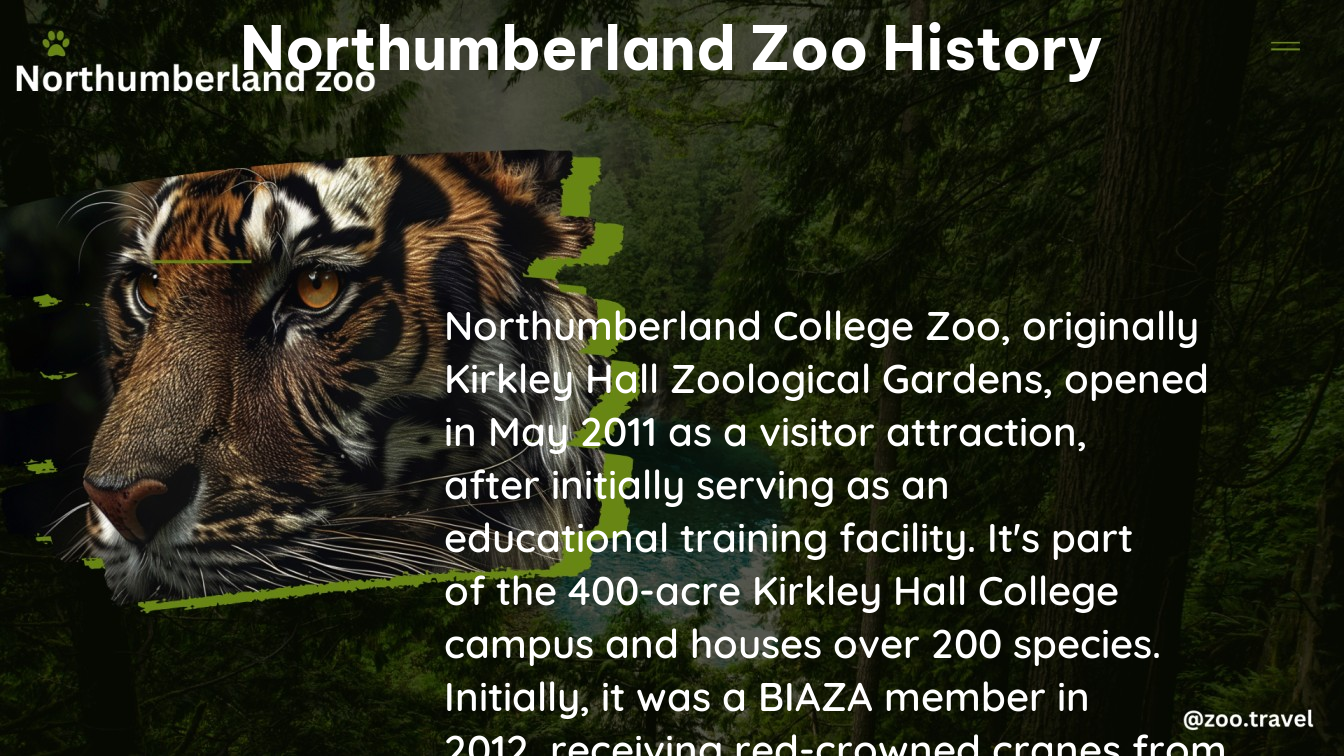The Northumberland Zoo, originally known as the Happy Chicken Farm & Tearoom, was established in 2009 by the Bradley family. It started as a small tearoom at Eshottheugh where rare-breed chickens were kept. In 2011, it became Eshottheugh Animal Park, with a growing collection of exotic species like Meerkats and Raccoons, funded by a Beef Jerky business. The park gained a full Zoo Licence in 2015.
The Evolution of Northumberland Zoo
From Happy Chicken Farm to Eshottheugh Animal Park
The Northumberland Zoo, originally known as the Happy Chicken Farm & Tearoom, was founded in 2009 by the Bradley family. It started as a small tearoom at Eshottheugh, where they kept a collection of rare-breed chickens.
In 2011, the family decided to expand the business and transformed it into Eshottheugh Animal Park. They began to introduce more exotic species to the park, such as Meerkats and Raccoons. The expansion of the animal collection was funded by the family’s Beef Jerky business.
Gaining the Zoo Licence
In 2015, Eshottheugh Animal Park was granted a full Zoo Licence, officially becoming a recognized zoo. This allowed the park to continue growing its animal collection and provide a more comprehensive experience for visitors.
Rebranding to Northumberland Country Zoo
In 2018, the park underwent a name change, becoming Northumberland Country Zoo. This new name better reflected the expanding collection of animals, which now included Canadian Lynx, Ring-tailed Lemurs, and Otters.
Northumberland Zoo’s Commitment to Conservation

In-Situ and Ex-Situ Conservation Efforts
The Northumberland Zoo is not just a place for entertainment, but also a hub for wildlife conservation in the northeast. The zoo is committed to increasing support for conservation programmes, both in-situ (in the wild) and ex-situ (in captivity).
In-Situ Conservation
The zoo contributes to the Snow Leopard Trust, a global organization dedicated to protecting these endangered big cats in their natural habitats.
Ex-Situ Conservation
The zoo partners with the Northumberland Wildlife Trust for Harvest Mice captive breeding, and works with the Environment Agency and the Northumberland River’s Trust for White-clawed Crayfish conservation.
Expanding the Animal Collection
In 2020, the Northumberland Zoo underwent further expansion, adding new species to its collection. In 2022, the zoo joined the European Endangered Species Programme (EEP) with the acquisition of Livingstone’s Fruit Bats.
The Northumberland Zoo Today
Diverse Animal Collection
The Northumberland Zoo is home to over 80 species, including Meerkats, Raccoon Dogs, Bush Dogs, Binturongs, Asian Palm Civets, small primates, fish, birds, and reptiles.
Sustainable and Eco-Friendly Practices
The zoo is a non-profit, family-run organization that is dedicated to on-site biodiversity and sustainability. It employs various eco-friendly practices to minimize its environmental impact.
Visitor Experiences and Events
The Northumberland Zoo offers a variety of experiences and events throughout the year, catering to visitors of all ages and interests. From guided tours to educational workshops, the zoo provides a unique and engaging experience for its guests.
Conclusion
The Northumberland Zoo has come a long way since its humble beginnings as the Happy Chicken Farm & Tearoom. Through its evolution, expansion, and commitment to conservation, the zoo has become a significant player in the northeast’s wildlife preservation efforts. As it continues to grow and adapt, the Northumberland Zoo remains a must-visit destination for anyone interested in the fascinating world of animals and their habitats.
Reference:
– Northumberland Zoo Official Website
– Northumberland Wildlife Trust
– Snow Leopard Trust
– European Endangered Species Programme (EEP)
